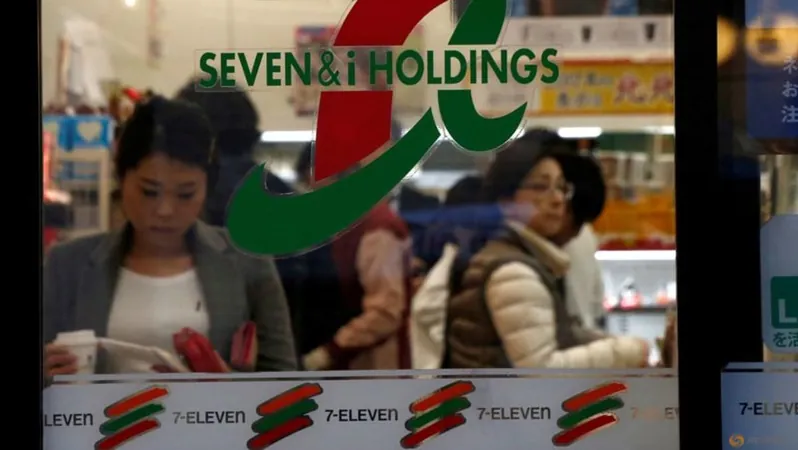
Japan's Economic Security at Stake: The Battle Over 7-Eleven!
2025-01-09
Author: Wei
Japan's Economic Security at Stake: The Battle Over 7-Eleven!
In a significant move reflecting its growing focus on “economic security,” Japan is set to scrutinize any potential foreign acquisition of 7-Eleven as Canadian company Alimentation Couche-Tard seeks to take over the world's largest convenience store chain.
After rejecting Couche-Tard's initial offer of nearly $40 billion last year, the Canadian firm is prepared to make a revised bid approximately 20% greater in hopes of acquiring Seven & i Holdings, the parent company of 7-Eleven. This latest twist in the ongoing saga has sparked fervent discussions among government officials, particularly in light of recent geopolitical tensions.
Japan's Minister for Economic Revitalization, Ryosei Akazawa, emphasized the critical role convenience stores play in national resilience, especially during disasters like earthquakes, which frequently impact the country. “If 7-Eleven becomes fully owned by foreign capital and prioritizes profit above all else, would they truly cooperate when a disaster strikes?” Akazawa questioned, highlighting concerns over the implications of foreign ownership.
His statement echoes broader sentiments within Japan, especially following a recent decision by U.S. President Joe Biden to block Nippon Steel’s $14.9 billion takeover of U.S. Steel due to national security worries. This raises questions about foreign investments in essential sectors, provoking a strong response from Japanese officials, particularly since Japanese investors funneled nearly $800 billion into the U.S. in 2023.
Furthermore, Japan’s finance ministry has recently classified Seven & i as a "core" industry integral to national security, a status it shares with essential sectors like nuclear power, rare earth materials, chip manufacturing, cybersecurity, and critical infrastructure—signifying the strategic importance of convenience stores in the Japanese economy.
Despite the ongoing acquisition discussions, Seven & i has insisted that this national designation is independent of Couche-Tard's interest. Interestingly, reports have indicated that the founding family of Seven & i is working on a counter-offer approximating 8 trillion yen ($50 billion).
As the stakes rise in this corporate showdown, Couche-Tard executives have reportedly stated they will not improve their bid further nor pursue a hostile takeover—essentially signaling a wait-and-see approach while market pressures mount. With 85,000 stores globally, and given the recent substantial dip in Seven & i’s net profit—an alarming 89% drop to 11.4 billion yen for the three months leading to November—activist shareholders may force the issue, urging for a swift resolution either towards the Canadian investor or a more robust counter-offer.
As this high-stakes drama unfolds, the implications for Japan's economic landscape and international investment strategy are immense. Can 7-Eleven retain its national roots amid increasing foreign interest while ensuring both profitability and resilience? Only time will tell. Stay tuned for updates on this developing story!
 Brasil (PT)
Brasil (PT)
 Canada (EN)
Canada (EN)
 Chile (ES)
Chile (ES)
 Česko (CS)
Česko (CS)
 대한민국 (KO)
대한민국 (KO)
 España (ES)
España (ES)
 France (FR)
France (FR)
 Hong Kong (EN)
Hong Kong (EN)
 Italia (IT)
Italia (IT)
 日本 (JA)
日本 (JA)
 Magyarország (HU)
Magyarország (HU)
 Norge (NO)
Norge (NO)
 Polska (PL)
Polska (PL)
 Schweiz (DE)
Schweiz (DE)
 Singapore (EN)
Singapore (EN)
 Sverige (SV)
Sverige (SV)
 Suomi (FI)
Suomi (FI)
 Türkiye (TR)
Türkiye (TR)
 الإمارات العربية المتحدة (AR)
الإمارات العربية المتحدة (AR)